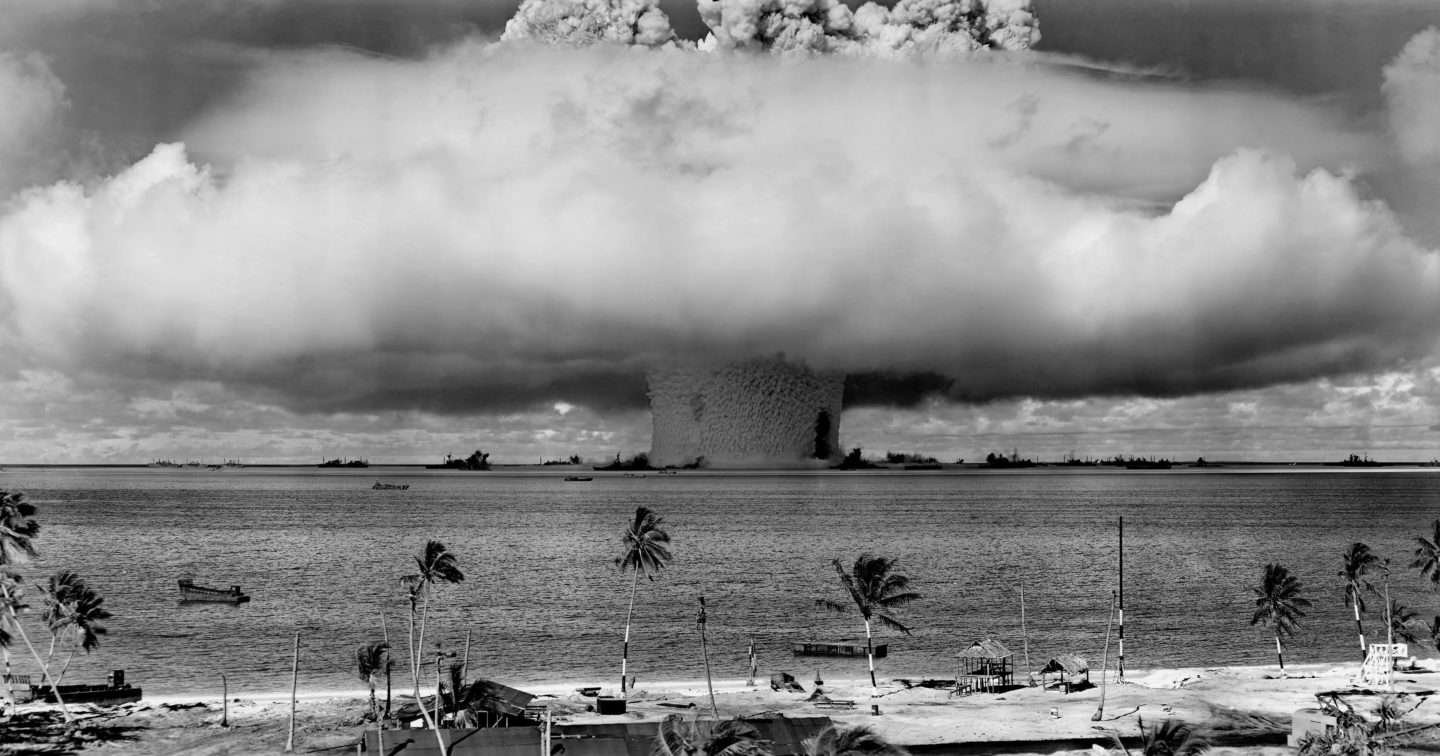Backed by Scotland’s First Minister, Nicola Sturgeon, but boycotted by Westminster, 122 countries have agreed a treaty for the “irreversible elimination” of nuclear weapons.
To cheering and a standing ovation, a United Nations (UN) meeting ended in New York on 7 July by giving overwhelming backing to the world’s first treaty “to prohibit nuclear weapons, leading towards their total elimination”.
But the UK government, other nuclear weapons states and most European countries did not take part in the UN negotiations, and have rejected the outcome. The UK argued it needed to keep a “nuclear deterrent” in case the country came “under grave threat”.
Sturgeon, however, sent a warm message of support to the conference. Nuclear weapons were an “issue of existential concern to all of the peoples of the world,” she said.
“Scotland, as host to the base for the entirety of the nuclear arsenal of the United Kingdom, has a particular interest in the outcomes of the conference in working towards the achievement of effective legal measures to attain and maintain a world without nuclear weapons.”
She quoted Sir Walter Scott in support of her “heartfelt wish” for a process that would rid the globe of nuclear warheads: “Dare to say and have the soul to believe”.
Sturgeon’s message was delivered by the SNP chief whip and nuclear disarmament campaigner, Bill Kidd MSP, who was in New York for the UN talks. The outcome was “historic”, he said. “Scotland’s voice has been heard even though the British government boycotted this remarkable event.”
Janet Fenton, vice-chair of the Scottish Campaign for Nuclear Disarmament, argued it was “imperative” for Scotland to now assert the right to sign and ratify the treaty. “The majority of Scotland’s democratically elected representatives at Westminster and at Holyrood see nuclear weapons as a wicked threat to the continued existence of life on this planet,” she said.
“That arrogant, insouciant threat has now been outlawed and Scotland is not to be expected to comply with it.” Between 8-16 July campaigners are planning a series of protests to disrupt the nuclear bomb bases at Coulport and Faslane on the Clyde.
Dr Rebecca Johnson from the Acronym Institute for Disarmament Diplomacy said: “Whether the UK government likes it or not, the treaty will increase the legal, economic and public pressures to halt Britain’s billion-pound spending spree on Trident renewal.”
The Costa Rican president of the UN conference, Elayne Whyte Gómez, argued that the world was now “one step closer” to eliminating nuclear weapons. “We feel emotional because we are responding to the hopes and dreams of the present and future generations,” she said.
Attempts had been made to ban nuclear weapons ever since the US first dropped them on Hiroshima and Nagasaki in August 1945, she pointed out. “The world has been waiting for this legal norm for 70 years.”
Article one of the UN treaty commits states to “never under any circumstances to develop, test, produce, manufacture, otherwise acquire, possess or stockpile nuclear weapons or other nuclear explosive devices”.
Article four commits states with nuclear weapons to “destroy them as soon as possible”. This must be done “in accordance with a legally binding, time-bound plan for the verified and irreversible elimination of that state party’s nuclear-weapon programme”.
The treaty describes any use of nuclear weapons as “abhorrent to the principles of humanity and the dictates of public conscience”. It will open for signature on 20 September 2017, and come into force after it has been ratified by 50 nations.
A vote on the final draft of the treaty was forced by the Netherlands, which ended up being the only country to vote against it. As a member of NATO, it hosts US nuclear weapons on its soil.
Along with the UK, the US, China, Russia, France, Israel, India, Pakistan and North Korea failed to turn up for the talks. The conference was also boycotted by Germany, Spain and Italy but backed by Ireland, Sweden, Austria and Switzerland.
The International Campaign to Abolish Nuclear Weapons (ICAN) described the treaty as “the beginning of the end of the nuclear age”. The strenuous objections of the nuclear-armed states showed that it had already had an impact, argued executive director, Beatrice Fihn.
She said: “No one believes that indiscriminately killing millions of civilians is acceptable – no matter the circumstance – yet that is what nuclear weapons are designed to do.”
The treaty, however, was immediately rejected by the UK, the US and France, who said they would not sign it. The UK government stressed the need for “gradual multilateral disarmament negotiated using a step-by-step approach, within existing international frameworks.”
In a statement the Foreign and Commonwealth Office in London insisted that the new treaty would not improve trust. “The unpredictable international security environment we face today demands the maintenance of our nuclear deterrent for the foreseeable future,” it said.
“We cannot rule out further shifts in the international security context which would put us, or our NATO allies, under grave threat. This treaty also risks undermining and weakening the Nuclear Non Proliferation Treaty, which has played an unparalleled role in curtailing the nuclear arms race.”
A version of this story was published in the Sunday Herald on 9 July 2017.
Photo thanks to the US Department of Defense, via Wikimedia Commons.














